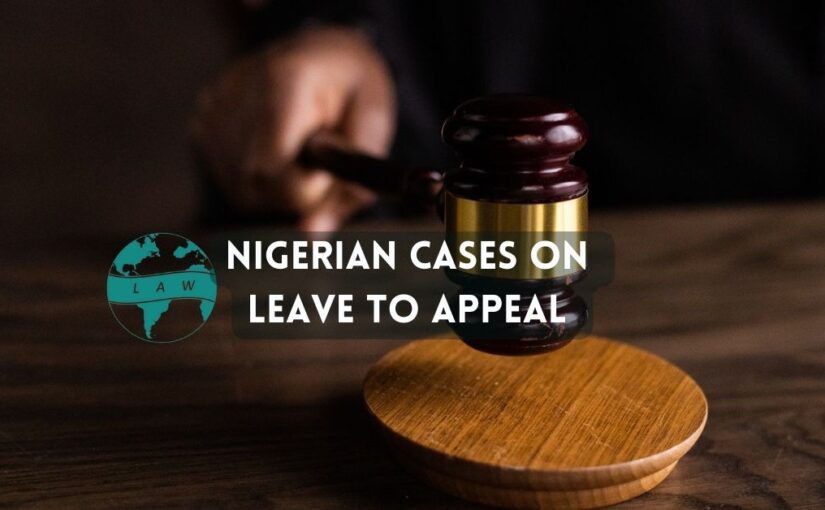Nigerian Cases on Leave to Appeal
“Leave” means permission. And it is settled law that, where no leave to appeal is obtained where one is required before appeal, such appeal is incompetent and is liable to be struck out. Below are some rationes decidendi on Leave to Appeal from Nigerian cases.
Meaning of Leave to Appeal
HON. ZAKAWANU I. GARUBA & ORS V. HON. EHI BRIGHT OMOKHODION & ORS (2011) 15 NWLR (Pt. 1269) 145 – Supreme Court
“leave” means permission. Before an appeal on grounds of mixed law and fact or on facts can be entertained by the Supreme Court, the applicant must seek and obtain leave from the Court of appeal or the Supreme Court. Failure to obtain leave renders the appeal incompetent and it will be thrown out. In the instant case, an examination of the grounds of appeal revealed that they were of mixed law and fact. Since leave was not obtained as required by the clear provisions of section 233(3) of the 1999 Constitution, the appeal was not valid. It was incompetent.
Instances where leave of court is not required
OYAKHIRE v. STATE (2006) LPELR-2863(SC)
“…The three authorities above cited by the learned Director of Public Prosecutions, no doubt, restated the general principle that leave is necessary to raise, on appeal before this court, an issue not raised at the courts below. But where however, appeal as of right is conferred on an appellant under the Constitution, he needs not obtain the leave of court. These are provided for in Section 233(2) of the 1999 Constitution.”
What a party must do on Required Leave to Appeal
TUNJI BOWAJE V. MOSES ADEDIWURA (1976) LCN/2290(SC)
Under the provisions of Section 31(2)(a) of the Supreme Court Act in a case where leave to appeal is required to be obtained, a party must not only file his application for leave to appeal within the period prescribed by the sub-section but must also file his notice and grounds of appeal, after having obtained the leave, within the same period.
The appellant/plaintiff in the present case failed to file his notice and grounds of appeal within three months as he ought to do. The ground on which the appellant-plaintiff relies for asking this court to exercise its discretion under Section 31(4) of the Act for extension of time is, as we have indicated earlier on, that his failure to file his notice and grounds of appeal immediately after the court below had given him leave was due to inadvertence or negligence of the counsel who held brief for his counsel in the court below.
This court would readily exercise its discretion to extend the periods prescribed for doing an act if it is shown to the satisfaction of the court that the failure by a party to do the act within the period prescribed was caused by the negligence or inadvertence of his counsel. (See T. A. Doherty & Anor v. R. A. Doherty (1964) 1 All NLR 299 and G.B.A. Akinyede v. The Appraiser (1971) 1 All NLR 162).
Effect of Failure to Obtain Required Leave
ROBERT I. IKWEKI & ORS. V. MR. JAMES EBELE & ANOR (2005) LLJR-SC
While discussing the need to obtain leave to appeal against an exercise of discretion in the grant of an adjournment, I must bear in mind that if an aggrieved person who requires leave to appeal fails to obtain such leave before bringing such appeal, the appeal is incompetent: See Yekini Onigbeden & Anor. v. Ishola Balogun & Anor. (1975) 1 All LR (Pt.1) 233; Tilbury Construction Co. Ltd. v. Ogunniyi (1988) 2 NWLR (Pt. 74) 64 and Nwadike v. Ibekwe (1987) 4 NWLR (Pt. 67) 718.
BABANGIDA IBRAHIM V. BATURE UMAR (2012) 7 NWLR (Pt. 1300) 507 – Court of Appeal
Where a party is mandated by the Rules of court to obtain leave of either the lower court or the appellate court before lodging an appeal against a certain class of the court’s decision, and he failed to obtain such leave, any notice of appeal filed by him in the absence of such leave shall be incompetent and liable to be struck out. (P. 528, paras. D-E)Per ORJI-ABADUA, J.C.A. at page 530, para. B:”There was no manifestation of procurement of the leave of either the lower tribunal or this court to file this appeal, and that alone endangered the sustenance of the appeal. The only natural consequence of such neglect is striking out of the process by the court for being incompetent.”
EHINLANWO v. OKE & ORS (2008) LPELR-1054(SC)
“It is settled law that, where no leave to appeal is obtained where one is required before appeal, such appeal is incompetent and is liable to be struck out.”
Proper Course After Appeal struck out for Failure to obtain Required Leave to Appeal
OPTIMUM CONSTRUCTION & PROPERTYDEVELOPMENT LIMITED V. AKE SHAREHOLDINGS LIMITED (2021) 18 NWLR (Pt. 1807) 148 – Supreme Court
Where an appeal is struck out for failure to seek and obtain leave to appeal where required, the proper course open to a party who desires to appeal, is to commence afresh the process of fulfilling the conditions precedent to filing a valid appeal, by applying for extension of time to seek leave to appeal, leave to appeal and extension of time to appeal under a new appeal number. There is no law prohibiting the prospective appellant from doing so.


Leave a Reply